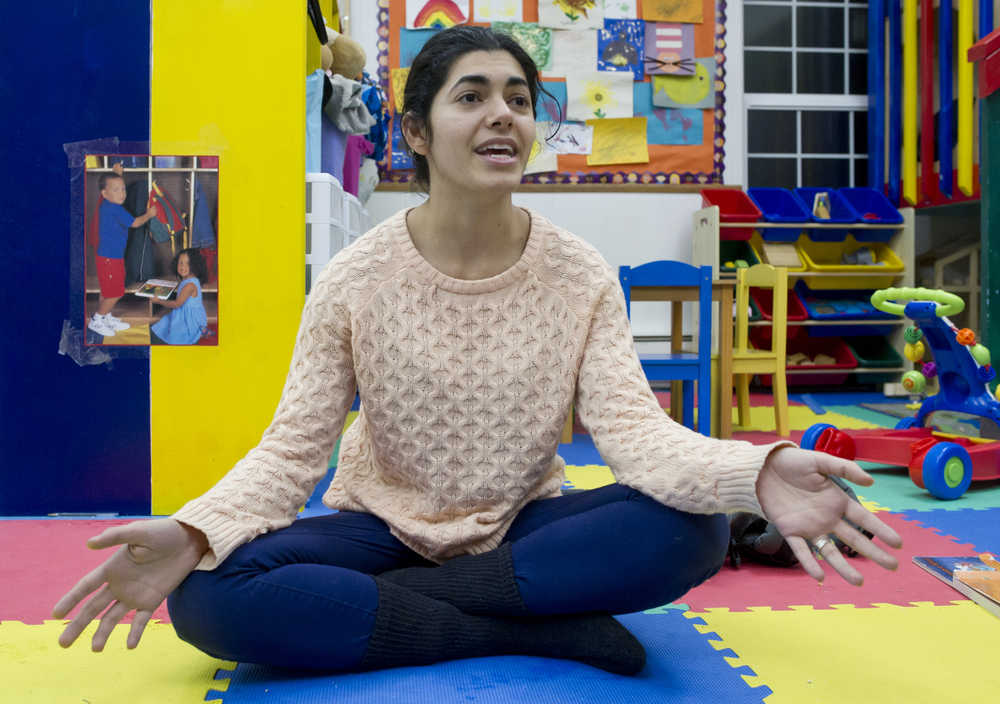“Imagine going into your home right now and then walking out, and that’s all you can bring with you for the rest of your life,” Israa Gehring, 23, said.
If anyone understands the realities of life as a refuge, it’s Gehring, who fled Iraq with her family when she was 4 years old.
Now, she wishes to help other refugees who are coming to the U.S. by organizing a donation drive for household items to help them start their new life.
During a recent interview at her daycare center on the back of Mendenhall Loop Road, Gehring took out her phone and pulled up an old picture of herself, when she was 5 year old standing next to her 3-year-old brother. They were both wearing pink shirts and shorts, clothing that someone gave them. It didn’t matter that they were “girl’s clothes,” she said; they were just grateful to have them.
And when she arrived in the U.S., she remembered receiving a white, plush rabbit with a draw string that was supposed to say something when pulled. She never learned what the rabbit said since it was broken, and yet, it meant a lot to her. She kept the toy until she was 16.
“When we arrived at the airport from Guam to Texas, there were refugee volunteers who had toys that they were giving out to us,” she said. “None of them were new, but to me they were new and to my brother, his toy was new. We all got one toy as soon as we arrived, and it was like this feeling I got, it was indescribable. It was kind of like it gave a feeling of hope considering how we had to leave.”
Gehring’s family left the country of Iraq in the cover of darkness at night. Neither she nor her siblings knew what was going on.
“My mom didn’t forewarn us because we were so young, we would go tell our friends,” she explained. “As soon as we left, our mom she was trying to explain ‘this is where we’re going’ and ‘this is why we’re leaving.’ My mom is Sunni and my dad Shiite. My mom is Arab and my dad is Kurd. When we left the country, it was very sudden,” she said.
She continued, “My mom was trying to explain to us — I was 4 and my little brother was 2 — what’s going on and why we’re leaving, what is Arabic, what is Kurdish, and my mother was like, ‘It’s the language you speak, it’s who you are, it’s what we believe in.’ And I was like, ‘I don’t understand why we’re leaving.’ And she said, ‘Well, your dad is one way and I’m another way, and so people don’t like us to be together.’ That was the only reason I ever got.”
Gehring’s family went to Guam first to be processed as refugees before they could enter the U.S. She can’t remember how long they lived there, but Gehring still remembers the island’s sunrises and sunsets.
“Once we were processed in Guam, we were given our state to live in, and our state was Texas, the Lone Star State,” she said. “My mom and dad were super excited because, ‘Everybody knows about cowboys.’ You don’t know anything about America, but you know Texas because of cowboys and Alaska because of the unknown.”
They lived in Texas for a short while until her father got a job with Fed-Ex and moved the family to Tennessee. From a volunteer organization, they were given clothes, furniture and appliances.
“Even though it’s not our home country, we’ve managed to call it home because we didn’t have anywhere else to go and call home,” Gehring said.
Now, one of her brothers is now an officer in the U.S. Navy. Another is a member of the U.S. Air Force and is trying to become an officer.
As for Gehring, she came to Alaska when she was 18 and she joined the Alaska Army National Guard. Then, just this year, she won a the battle to open Gehring Nursery School, her own daycare center.
“I know there is a lot of negative stigma right now about refugees,” Gehring said. “They’re like, ‘Oh, they’re just going to come here and start a lot of crime.’”
Her own story of coming to America, and then going on to serve her country and opening a daycare center demonstrates that’s certainly not the case, she said.
“This is what refugees can do,” she said. “This is what can come from one story.”
Gehring and several Army National Guard members who are helping her with the donation drive will be collecting household items the week of Jan. 5 on Friday, 3-7 p.m. and Saturday and Sunday, from 9 a.m.-4 p.m. at the back of her daycare center, located at 4341 Windfall Avenue.
The donated items can be anything from couches to clothes, toys to appliances. Any items in decent condition are welcomed, she said, even broken crayons. The only exceptions are items for pets and toiletries.
“There is nothing that they wouldn’t appreciate,” she said. She added that refugees probably haven’t heard of Keurigs but would be happy with a regular coffee pot; they probably aren’t looking for smart, flat-screen TVs, but an old TV capable of hooking up to a VHS or DVD player would be wonderful.
All the donated items will be loaded into a conex provided by Lynden Transport which will go to Seattle in mid-January and then to World Relief Seattle in Kent, Washington, for distribution to refugees.
“I left a country with nothing, and then I came and somebody gave me toy and said, ‘Welcome,’” Gehring said. “I want to be able to do that for those kids.”
• Contact Clara Miller at 523-2243 or at clara.miller@juneauempire.com.

